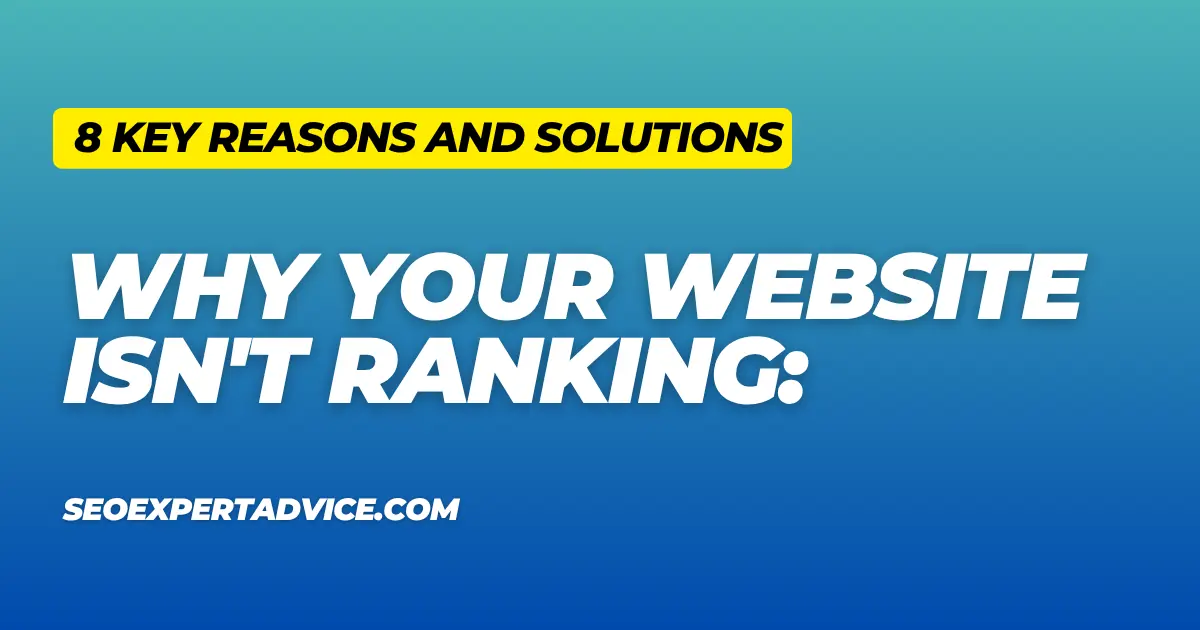Struggling to improve your website’s ranking on search engines? Many website owners face challenges that prevent their sites from appearing at the top of search results. From technical issues to ineffective SEO strategies, several factors can hinder your site’s visibility. In this guide, we explore eight common reasons why your website isn’t ranking and provide expert-backed solutions to boost your SEO performance. This article is designed to help you enhance your site’s ranking with actionable steps, ensuring expertise, authority, and trustworthiness (E-A-T) in every solution.
1. Insufficient Indexing
Problem: If search engine bots haven’t crawled and indexed your website’s pages, they won’t appear in search results, reducing your ranking potential.
Solution: Submit your sitemap to Google Search Console to ensure all pages are discoverable. Regularly check for crawl errors or blocked resources using SEO tools and optimize your robots.txt file to guide bots effectively. This improves indexing and supports better website ranking.
2. Weak On-Page SEO
Problem: Unoptimized content and poor website structure can confuse search engines and harm user experience, lowering your ranking.
Solution: Conduct thorough keyword research to identify terms relevant to your audience. Integrate these keywords naturally into your content, titles, meta descriptions, and headings. Focus on creating high-quality, user-focused content and ensure intuitive navigation to enhance SEO and boost your website’s ranking.
3. Lack of Backlinks
Problem: Without quality backlinks from authoritative websites, your site’s credibility and ranking suffer due to limited trust signals.
Solution: Develop shareable, valuable content that naturally attracts links. Engage in relevant online communities, pursue outreach campaigns, and explore guest blogging opportunities to build high-quality backlinks. These efforts strengthen your site’s authority and improve its ranking over time.
4. Technical Issues
Problem: Slow loading speeds, broken links, mobile-unfriendly designs, or poor Core Web Vitals scores can negatively impact user experience and SEO ranking.
Solution: Use tools like Google PageSpeed Insights to optimize website speed. Fix broken links, implement responsive design for mobile compatibility, and address Core Web Vitals to enhance performance. These technical improvements are critical for better ranking.
5. Keyword Competition
Problem: Targeting highly competitive keywords without sufficient authority makes achieving a high ranking challenging.
Solution: Focus on long-tail keywords with lower competition to gain traction. Target niche topics aligned with your audience’s needs and gradually build authority to compete for broader terms. This strategic approach improves your website’s ranking potential.
6. Poor SEO Practices
Problem: Spammy backlinks or content scraping can damage your site’s reputation, leading to penalties that harm your ranking.
Solution: Monitor your backlink profile with SEO tools like Ahrefs or SEMrush. Disavow low-quality links, enhance website security to prevent scraping, and address any penalties in Google Search Console. These steps protect your site’s trustworthiness and ranking.
7. Lack of Content Updates
Problem: Outdated or static content fails to engage visitors and signals inactivity to search engines, reducing your ranking.
Solution: Regularly refresh your content with up-to-date information and trending topics. Publish new posts to maintain user engagement and signal activity to search engines. Consistent updates are essential for improving your website’s ranking.
8. Mismatching Search Intent
Problem: Content that doesn’t align with user search intent fails to satisfy visitors, leading to lower engagement and ranking.
Solution: Analyze search queries to understand user intent. Tailor your content to address specific needs and expectations, ensuring relevance. Aligning content with intent enhances user satisfaction and boosts your website’s ranking.
Building Topical Authority for Long-Term Ranking Success
Achieving a high ranking requires establishing topical authority in your niche. This involves creating comprehensive, high-quality content that positions your site as a trusted resource. Here’s how to build topical authority:
- Conduct In-Depth Research: Understand your niche, audience needs, and competitor content to identify gaps and opportunities.
- Develop a Robust Content Strategy: Create diverse content types (e.g., articles, videos, infographics) that thoroughly cover niche topics.
- Implement Semantic SEO: Focus on user intent, using related terms and synonyms to optimize content naturally.
- Use Keyword Clustering: Group related keywords into clusters and create in-depth content for each subtopic to enhance relevance.
- Continuously Optimize: Monitor performance with analytics tools, update content regularly, and adapt to evolving SEO trends.
Building topical authority takes time but significantly improves your website’s ranking by establishing trust and expertise.
FAQs
Why isn’t my website appearing in search results?
Your website may not be indexed properly or could have technical SEO issues. Check Google Search Console for errors and optimize your content to improve ranking.
How can I quickly improve my website’s ranking?
Submit your sitemap to Google Search Console, fix technical issues, and optimize content with relevant keywords. Building quality backlinks also boosts ranking.
What are Core Web Vitals, and why are they important?
Core Web Vitals measure user experience factors like loading speed and visual stability. They’re critical for ranking as search engines prioritize user-friendly sites.
How long does it take to build topical authority?
Topical authority requires months or years of consistent, high-quality content creation. Regular updates and strategic SEO practices are key to improving ranking.
Conclusion
Boosting your website’s ranking involves addressing technical, content, and authority-related challenges. By fixing indexing issues, optimizing on-page SEO, building quality backlinks, and aligning content with user intent, you can enhance your site’s visibility. Additionally, establishing topical authority through in-depth, relevant content strengthens your site’s credibility and ranking potential. Implement these expert-backed solutions consistently, and consider consulting an SEO professional for tailored strategies to achieve long-term success in search engine rankings.


2 Responses